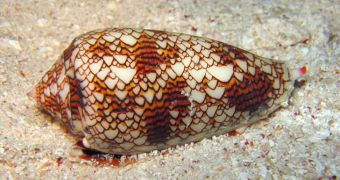It has been revealed that scientists are currently attempting to use a tiny protein found in cone snails' venom to create a pain relief drug for people suffering from severe and chronic nerve pain.
Cone snails are marine animals typically found in the western Pacific and Indian Ocean. They are venomous and capable of “stinging” humans. The animals hide under their shells a great amount of small proteins known as conotoxins which they deliver with a harpoon-like strike. They usually use the venom to paralyze their prey.
The different toxins contained in cone snails' venom vary in their effects. Some are extremely toxic and can even prove fatal to human beings, while others appear to have an analgesic effect in humans.
Each toxin targets a specific nerve channel or receptor. Some cone snail venoms also contain a pain-reducing toxin, which the snail uses to pacify the victim before immobilizing and killing it.
Experts have recently discovered that cone snails' venom is showing great promise as a source of new, medically important substances. Lead researcher David Craik from the University of Queensland, Australia, revealed that his team used a tiny protein to create five new “experimental substances” capable of alleviating chronic nerve pain.
According to Metro, the new experimental drug is considered to be about 100 times stronger than morphine or gabapentin.
Professor David Craik said, “This is an important incremental step that could serve as the blueprint for the development of a whole new class of drugs capable of relieving one of the most severe forms of chronic pain that is currently very difficult to treat.”
Researchers are currently working to develop a conotoxin-based medicine that can be taken orally. The only drug that uses the protein now is called ziconotide and has already been approved for human use, but must be injected into a patient’s spine.
Although the new medicine has not been tested yet on humans, the tests performed on rats have shown that the prototype drug is capable of significantly reducing pain.
“We don't know about side effects yet, as it hasn't been tested in humans. But we think it would be safe,” Prof Craik said, cited by ITV.
Compared to the typical opioid painkillers, which can be highly addictive, the animal venoms work in a different manner, blocking various channels in the nervous system.
“It acts by a completely different mechanism than morphine so we think it has a minimal possibility of producing the side-effects of that medication. That is one of the big advantages of this drug,” he added.
Prof Craik and his team will present their finding at an American Chemical Society conference.

 14 DAY TRIAL //
14 DAY TRIAL //